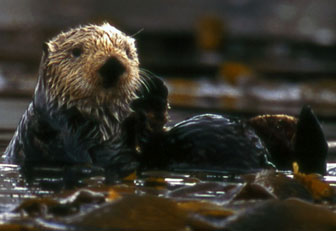Bush sued for failing to protect sea otters
Bush sued for failing to protect sea otters
R. Butler, mongabay.com
December 19, 2006
A conservation group filed a lawsuit Tuesday in federal district court in Washington, DC, seeking more protection for sea otters in Alaska.
The Center for Biological Diversity, a national nonprofit conservation organization that aims to conserve endangered species and wild places, says that the Bush administration has failed to designate critical habitat for sea otters in southwest Alaska, despite the species’ listing as Threatened under the Endangered Species Act in August 2005. Sea otter populations have decline by 90 percent in some areas according to the group.
“Once again we are forced to ask the courts to require Bush administration officials to comply with the law,” said Miyoko Sakashita, an attorney for the Center for Biological Diversity. “The Department of the Interior should be protecting Sea Otter habitat; instead, they are proposing oil drilling near it.”

Sea otters prey on herbivores that live off the drifting, dead kelp abundant along the Pacific coast. Photograph by Chris Brown, USGS |
The Center for Biological Diversity says that the Department of the Interior has proposed opening up areas in the Bering Sea to offshore oil development and that the Bush administration is considering a ban on drilling in Bristol Bay, actions that could prove damaging to sea otter populations.
“Oil development in these areas could be devastating for the Sea Otter,” said the Center for Biological Diversity in a statement. “Because they rely on their fur as insulation against the cold, Sea Otters are extremely vulnerable to oil spills. As many as a thousand Sea Otters died from the Exxon Valdez oil spill in 1989, while more recently, the Selendang Ayu oil spill in the Aleutian Islands in December 2004 killed numerous otters from this highly-endangered population.”
U.S. Fish and Wildlife Service researchers say that the population of sea otters in Alaska’s Aleutian Islands have plunged since the 1980s when an estimated 55,000 to 100,000 sea otters lived in the area. A 2000 survey found only 6,000 otters. No one knows what is causing the decline, though climate change and over-fishing, which may have affected predator-prey relationships in the region, have been put forth as possible culprits.














